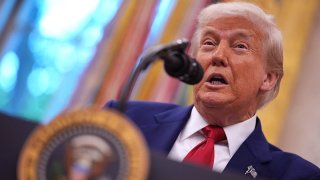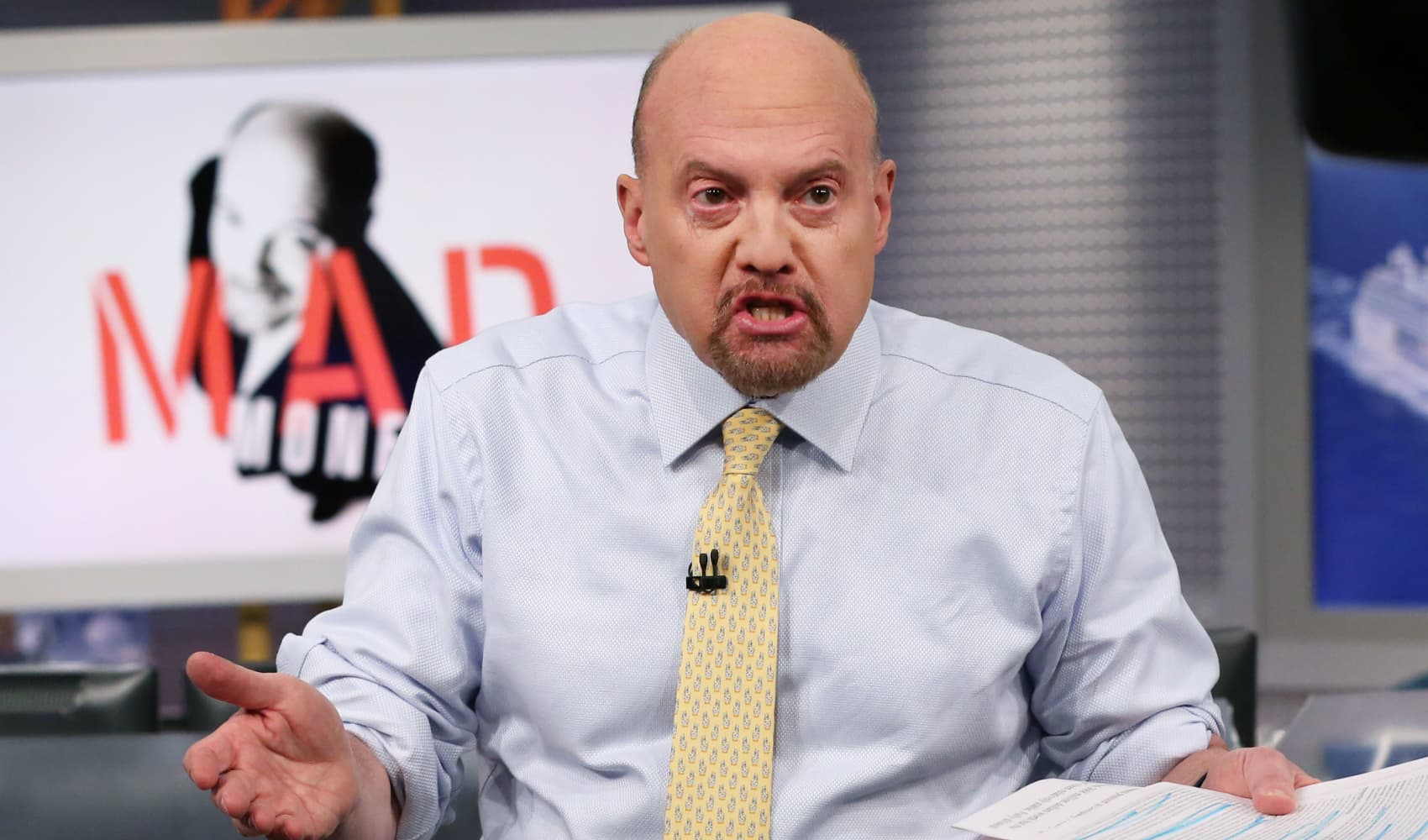
This was CNBC's live blog covering European financial markets.
European stock markets close lower
Watch NBC 5 free wherever you are
European stock markets closed lower on Thursday, as investors rode the latest turn in the Trump tariff rollercoaster. Europe's Stoxx 600 index ended the session 0.19% lower, with Germany's DAX down 0.44%.
To recap, on Wednesday evening a federal trade court struck down President Donald Trump's "reciprocal tariff" policy, which slapped hefty universal duties on imports from countries around the world, and ordered the administration to stop collecting them.
Get top local stories delivered to you every morning with NBC DFW's News Headlines newsletter.

Global equities initially brightened on the news, though economists and U.S. officials alike argue that Trump is likely to find a work-around to the block. Meanwhile, analysts point out that a huge number of uncertainty still hangs over businesses and global trade.
"The upside risks to U.S. inflation and downside risks to GDP would be reduced if the Supreme Court also rules against the tariffs imposed under the International Emergency Economic Powers Act, but it would be unlikely to mark the end of the tariff war given the various other routes through which the Trump administration could impose tariffs," economists at Capital Economics said in a note.
Money Report
On Friday, we'll be monitoring preliminary German inflation figures ahead of the European Central Bank's monetary policy meeting next week.
— Jenni Reid
How Germany’s DAX outperformed its peers to become the new market darling
Germany's DAX was last down 0.4% on Thursday, but the blue chip index is nonetheless up more than 20% in the year to date, with sectors from banking and industrials to defense boosted by anticipation of a fiscal spending boost.
Earlier today, Laura Cooper, head of macro credit and global investment strategist at Nuveen, spoke to CNBC's "Early Europe Edition" about the drivers of the year's outperformance and why we might see "more tepid advances" going forward. Watch below:
— Jenni Reid
European stocks fall into the red
Despite positive momentum stateside, European markets have wiped out their earlier gains, with the regional Stoxx 600 index moving to a 0.12% loss.
Media and utilities stocks are the worst performers, both down around 0.5%. U.K. online car sales marketplace Auto Trader is down 11% after its annual revenue missed analyst expectations. Data separately out on Thursday showed an 8.6% decline in British car manufacturing output in April.
— Jenni Reid
Strong start on Wall Street
The main U.S. indexes are off to a solid start on Thursday, with the S&P 500 up 0.8%, the Nasdaq Composite up 1.5% — putting it back in positive territory for the year — and the Dow Jones Industrial Average nudging 0.1% higher.
As well as the Trump tariff ruling, investors are still digesting results from technology bellwether Nvidia, which beat expectations on the top and bottom lines in the first quarter. Shares were up more than 5% on Thursday.
— Jenni Reid
Trump's negotiating position is weakened by tariff ruling: Aberdeen
President Donald Trump's negotiating power over tariffs has been weakened even if he eventually finds a way to restore much of his policy, notes Lizzy Galbraith, senior political economist at Aberdeen.
"The administration will almost certainly appeal the ruling and seek to lift the block on IEPPA tariffs while the case is ongoing. The case will first go to the US Court of Appeals for the Federal Circuit but is likely to end up in the Supreme Court," Galbraith said in a note.
"Nevertheless, the ruling has significant implications for countries that were in trade negotiations with the U.S. Many are likely to wait for clarity on whether the block on tariffs is maintained before making big concessions. So, the ruling undercuts Trump's negotiating leverage," she added.

Andrew Thurston, customs duty senior manager at professional services firm MHA, flagged questions arising for businesses resulting from the decision.
"While imports surged in the first quarter as businesses looked to avoid tariffs from April, can we expect a similar effect while we wait for the decision of the appeal? Perhaps, but businesses continue to navigate murky waters and will be wary of making wholesale strategic changes in such a turbulent environment," Thurston said.
"Not only will tariffs at U.S. customs be halted for the foreseeable, but will businesses that have already paid 'illegal' tariffs on U.S. imports be reimbursed? If so, this would be a sizeable task for the U.S. customs authorities and businesses may be left in the dark for a long period of time."
— Jenni Reid
Stocks pare gains as investors eye potential tariff block workarounds
Global stock markets have pared some of their initial enthusiasm on the news Wednesday night that the U.S. Court of International Trade has ordered President Donald Trump's "reciprocal" tariff orders be vacated.
Much commentary on Thursday morning has centered on potential workarounds the Trump administration may find to continue with its controversial policy.
Europe's Stoxx 600 index was 0.2% higher at 1:24 p.m. in London, down from gains of around 0.5% earlier in the session, with the U.K.'s FTSE 100 near-flat and Germany's DAX up just 0.1%. Travel stocks led gains, with the sector up 1.15%.
U.S. stock futures remained positive, though cooled from gains seen in the early hours, while the euro and British pound both moved from losses to respective gains of 0.12% and 0.07% against the U.S. dollar.
— Jenni Reid
Nationwide touts ‘outstanding’ year as profit jumps 30%
Outside of the reaction to U.S. tariffs facing a legal hurdle, U.K. building society Nationwide has reported a 30% jump in annual statutory profit before tax, which rose to £2.3 billion ($3.1 billion) in the year to March.
The company said it returned a record £2.8 billion to its members in its 2025 fiscal year, citing record growth in mortgages and retail banking deposits, as well as "excellent cost discipline," following its acquisition of Virgin Money.
CEO Debbie Crosbie touted Nationwide's "outstanding" year in a statement alongside the results, while Chairman Kevin Parry said the Virgin Money deal "represented a significant strategic advance for Nationwide."
— Chloe Taylor
Trump likely to find a way around court ban on reciprocal tariffs, says Goldman Sachs

The White House is likely to find a way around a U.S. court ruling that struck down steep reciprocal tariffs imposed by President Donald Trump in April, according to Goldman Sachs.
Read more about the Court of International Trade's (CIT) ruling here.
The Wall Street bank said the Trump administration is likely to appeal the decision, but would also seek to use executive power under Section 301 of the Trade Act of 1974 to reimpose tariffs. This was the basis of Trump's tariffs on China during his first term.
"As the administration can impose an across-the-board tariff and country-specific tariffs under other legal authorities (e.g., Sec. 122 and Sec. 301) this ruling represents a setback for the administration's tariff plans and increases uncertainty but might not change the final outcome for most major US trading partners," said Goldman's chief economist Jan Hatzius in a note to clients.
"As it seems unlikely that the administration could win an appeal in the 10 days it has under the CIT order to remove the tariffs, we would expect the White House to announce a similar across-the-board tariff using Sec. 122," Hatzius added.
Section 122 of the same Act allows the White House to impose import tariffs of up to 15% for up to 150 days on nations that have "large and serious" trade surpluses with the U.S.
Goldman's economist also suggested that while the White House is likely to find ways to reimpose tariffs, it's unlikely to be able to do it for all the nations targeted in the so-called "Liberation Day" announcement.
"This would then provide the administration time to launch a series of Sec. 301 cases against larger trading partners, potentially opening the door to imposing tariffs higher than 10% in some cases. However, it seems unlikely that the administration could complete Sec. 301 investigations on every US trading partner within the next several months," Hatzius added.
— Ganesh Rao
Dollar strengthens as Trump’s tariffs blocked
The U.S. dollar index — which measures the greenback against a basket of major rivals — is up 0.2% after U.S. judges threw cold water on President Donald Trump's tariffs plans.
The euro was 0.2% lower against the dollar by 8:11 a.m. in London, while the British pound was 0.1% lower versus the greenback. The Swiss franc, often considered a safe haven in times of market turmoil, was 0.3% lower against the U.S. currency.
The U.S. dollar has shed almost 8% so far this year, as U.S. trade policy rocked markets and sparked a so-called "Sell America" trade.
— Chloe Taylor
European stocks open higher
It's 20 minutes after the opening bell in Europe, and stocks are moving higher as investors react to the U.S. Court of International Trade blocking President Donald Trump's "reciprocal" tariffs.
The pan-European Stoxx 600 was last seen trading 0.4% higher, with most sectors in positive territory.
Tariff-sensitive tech, mining and autos stocks led gains, up 1.8%, 1.1% and 0.9%, respectively.
— Chloe Taylor
Some European markets closed today

Several European countries, including France, Belgium, Germany, Norway, the Netherlands and Switzerland, are observing the Christian holiday Ascension Day on May 29.
Most major markets will be open for trade through the holiday.
— Chloe Taylor
German defense firm Renk looks to struggling auto sector for new talent as it scales up
Tank parts maker Renk is eyeing up talent from the auto sector as it races to scale up and fuel growth in the wake of rising geopolitical tensions and soaring military spending.
Earlier this year Germany passed a historic fiscal package that enabled a steep increase in the defense spending capabilities of Europe's largest economy. The 27-member state bloc is scaling up its defense efforts amid the war in Ukraine and the increasingly strained transatlantic security partnership.
Renk, a global leader in creating gear boxes for tanks, is among the defense firms that has seen its stock rally on the back of increased military spending. Its share price rose over 300% so far this year and its order book jumped 164% to 549 million euros ($622.3 million) in the first quarter.
— Lily Meckel
Global stocks on the rise after court halts Trump’s tariffs plans
European shares aren't the only ones on the rise in the wake of the U.S. Court of International Trade's Wednesday ruling.
Stocks listed in the Asia-Pacific region have been climbing overnight, while U.S. stock futures have jumped as investors cheer the blow to the U.S. president's reciprocal tariffs rollout.
— Chloe Taylor
In case you missed it: Federal trade court strikes down Trump’s reciprocal tariffs
The U.S. Court of International Trade on Wednesday blocked steep reciprocal tariffs unilaterally imposed by President Donald Trump on scores of countries in April to correct what he said were persistent trade imbalances.
The ruling deals a potentially serious blow to the Republican president's economic agenda and ongoing efforts to negotiate trade deals with various nations.
— Christina Wilkie, Erin Doherty, Lora Kolodny, Kevin Breuninger
Futures move higher after Trump’s tariffs blocked
Good morning from London. It's just over an hour until European financial markets open, and equities listed in the region look set to move higher when trade kicks off.
Futures tied to the German DAX index were last seen trading 1.2% higher, while FTSE 100 futures gained 0.8% and those tied to France's CAC 40 were up by 0.2%.
Pan-European Stoxx 600 futures have jumped 1.3%.
The moves come after the U.S. Court of International Trade on Wednesday blocked President Donald Trump from imposing his swathe of country specific tariffs — policies that could see some countries soon hit with import duties exceeding 40%.
— Chloe Taylor






